Kenneth L. Gentry Jr.'s Blog, page 10
November 19, 2024
YAHWEH
 PMW 2024-089 by Kenneth L. Gentry, Jr.
PMW 2024-089 by Kenneth L. Gentry, Jr.
In Hebrew God’s distinctive covenant name appears as four consonants: YHWH (pronounced Yahweh). It appears in English versions in all caps as: LORD (or sometimes GOD when linked with Adonai, which also is translated “Lord”). In Exodus 3:14 God defines himself via his special covenantal name. This name is so significant in redemptive history that the Scriptures can simply mention “the name” (Lev. 24:11, 16). God jealously declares that this is his name “forever” (Exo. 3:15; cp. Psa. 102:12; 135:13).
This name first appears, not in Gen. 1 where God’s power is exhibited (therefore, Elohim appears there). Rather it appears first when the LORD lovingly creates then covenants with Adam (see note at Gen. 2:4). Contrary to critics, it does not represent another and competing tradition about who the God of Israel is, but is used in his revelation from the beginning.
This revelation certainly is not of a new name developed here. After all, why would Moses go to a people who are asking who sent him, then give them a name they had never heard before? Rather it is being urged here to establish Moses’s authoritative call to lead them. Besides in vv. 15–16 we see that it is his name “forever” and was used with the God of “your fathers.” In fact, it appears in Genesis 162 times, with thirty-four of those times being spoken by actors in the Genesis drama, not just Moses as the narrator.

As It Is Written: The Genesis Account Literal or Literary?
Book by Ken Gentry
Presents the exegetical evidence for Six-day Creation and against the Framework Hypothesis. Strong presentation and rebuttal to the Framework Hypothesis, while demonstrating and defending the Six-day Creation interpretation.
See more study materials at: www.KennethGentry.com
Here in Exodus 3:14 he explains his name as meaning “I am that I am.” This self-designation is peculiarly important to our understanding of God’s covenant love. This name-statement is found in the imperfect tense in Hebrew, thereby emphasizing a constantly manifested quality. It is a very active name. Jewish Hebrew scholar Umberto Cassuto comments: “There is also implicit in this interpretation the thought of implementing the promises: I am who I am always, ever alike, and consequently I am true to My word and fulfil it.”
The name and its meaning is enormously important for this very moment in Moses’s life and Israel’s history. For he is going to lead Israel out of Egypt by confronting the most powerful ruler in the riches nation on earth. He needs to know God is always with him. As God declares later to Isaiah: “My people shall know [i.e., experience the reality of] my Name” (Isa. 52:6).
From this name we may discern certain divine characteristics that greatly impact redemption. (1) It requires that he is wholly uncreated and self-existent. Nothing accounts for God’s existence other than himself (John 5:26; Acts 17:25; cp. Isa . 40:20–25). Thus, Moses’s Pentateuch opens with “in the beginning God” (Gen. 1:1a) — for he “created all things” (Eph. 3:9). Yahweh is not like the dependant primeval forces that supposedly gave birth to the Egyptian gods. Moses need not fear those mythological gods.
(2) It speaks of his eternity: He is not constrained or defined by time; he is of eternal duration. The combination of the verb tense (imperfect) and its repetition (“I am” / “I am”) emphasize his uninterrupted, continuous existence. “From everlasting to everlasting, You are God” (Psa. 90:2; cp. Psa. 93:1–2; Isa. 40:28; 57:15).
(3) It relates his absolute sovereignty: He determines all things from within his own being. He can declare absolutely “I am that I am,” without fear of anything challenging or overthrowing him. He has no need of anything outside of himself (Isa. 40:9–31), for “I am God, and there is no one like Me” (Exo. 9:14; cp. Isa. 44:7; Jer. 50:44).
(4) Because of all of this he is unchangeable. He declares “I, the LORD, do not change” (Mal. 3:6). He is forever the same, for in him “there is no variation, or shifting shadow” (Jms. 1:17). Thus, he can be trusted to be the same “yesterday and today and forever” (Heb. 13:8; cp. Num. 23:19).
Reformed Eschatology in the Writings of Geerhardus Vos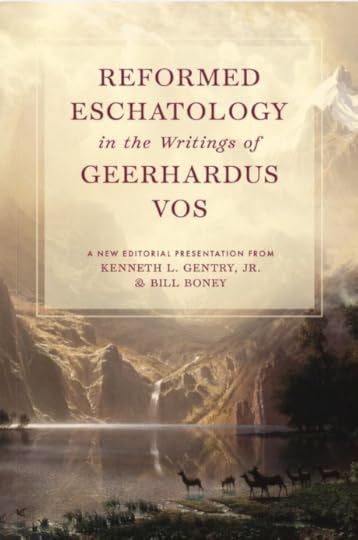
Ed. by Ken Gentry and Bill Boney
This is a collection of several key eschatological studies by the renowned Reformed theologian Geehardus Vos. We have modernized Vos’ grammar and syntax and updated his layout style according to modern publishing conventions (shorter sentences and paragraphs). We did this without changing any of Vos’ arguments.
For more information on this new Vos work or to order it, see:
https://www.kennethgentry.com/reformed-eschatology-in-the-writings-of-geerhardus-vos/
November 15, 2024
EDEN AND ANIMAL DEATH?
 PMW 2024-088 by Kenneth L. Gentry, Jr.
PMW 2024-088 by Kenneth L. Gentry, Jr.
Despite recent unorthodox influences on evangelical Christians, numerous arguments demand that animal death results from God’s curse on creation after Adam’s fall, rather than being a feature of God’s original creational activity. Consider the following:
FIRST, by divine decree man and animals were herbivorous originally. In Genesis 1:29-30 God grants only vegetation for food, for both man and animals. As Hamilton notes regarding man’s dominion over the animals: “such dominion does not allow him to kill these creatures or to use their flesh as food. Only much later (9:3, post-Flood) is domination extended to include consumption” (Hamilton, 139). He continues: “Man is to have as his food the seed and fruit of plants. Animals and birds are to have the leaves. . . . At no point is anything (human beings, animals, birds) allowed to take the life of another living being and consume it for food. . . . What is strange, and probably unexplainable (from a scientific position), is the fact that the animals too are not carnivores but also vegetarians” (Hamilton, 140; cp. Wenham, 33).
UNDERSTANDING THE CREATION ACCOUNT (5 DVDs)
by Ken Gentry
These formal conference lectures present important information for properly approaching the Creation Account in Genesis. They lay the groundwork for analyzing the text by means of sound exegetical methodology. In doing so, they defend the view that God created the universe in six, twenty-four days. They do not give an exposition of the six day process, but show why it is the necessary result of reading the Creation Narrative.
See more study materials at: www.KennethGentry.com
SECOND, the “death” of vegetation is of a qualitatively different order, and not as a result of divine curse, for:
(1) God expressly designs vegetation alone for food consumption (Ge 1:29-30).
(2) Plants lack a nephesh, unlike animal and man (Ge 1:20, 24, 30; 2:7). In fact, both animal (Ge 1:20-21, 24; 9:10) and man (Ge 2:7) are called “living creatures” (nephesh hayah). Of Genesis 1:20-24, Waltke explains: “Man is here being associated with the other creatures as sharing in the passionate experience of life and is not being defined as distinct from them.”
(3) Plants do not possess the “breath (ruach) of life,” as do animals and man (Ge 6:17; 7:15, 22).
(4) Scripture never ponders the loss of a plant’s ruach, as it does animal’s and man’s (Ecc 3:20); in fact, a similarity exists between man’s ruach and animal’s (Ecc 3:19).
(5) When animal life “returns to the dust” it is because God “hides his face” (Ps 104:29). Scripture does not present God responding to plant death in such a way.
THIRD, the creation account does not record God’s “blessing” creation until the creation of sentient life on Day 5 (Ge 1:22). By this means of blessing, God draws a distinction between the zoological and the botanical orders of life. In that “blessing” often implies fecundity — which plants also have (Ge 1:11-12) — the lack of God’s “blessing” plant life indicates this divine benediction is more than endowing living organisms with the capacity to multiply (contra Kline, “Space and Time,” 6; Irons, 28).
FOURTH, Paul relates the effects of the curse upon the creation in such a way that surely implies the post-fall creation must be quite different from the original, uncursed world. He even strongly suggests that animal death is a consequence of it: “For the creation was subjected to futility, not of its own will, but because of Him who subjected it, in hope that the creation itself also will be set free from its slavery to corruption into the freedom of the glory of the children of God. For we know that the whole creation groans and suffers the pains of childbirth together until now” (Ro 8:20-23). Note that this “slavery to corruption” and “groaning and suffering” result from God’s “subjecting creation to futility” — obviously by divine curse.
In fact, according to the Westminster Larger Catechism 29: “The punishments of sin in this world are either inward, as blindness of mind, a reprobate sense, strong delusions, hardness of heart, horror of conscience, and vile affections; or outward, as the curse of God upon the creatures for our sakes, and all other evils that befall us in our bodies, names, estates, relations, and employments; together with death itself.” According to Murray, the bondage of corruption in the creation itself (Ro 8:21) “must be taken in the sense of the decay and death apparent even in non-rational creation.” (For more information on this matter see later arguments.)
AS IT IS WRITTEN (by Ken Gentry)
The framework hypothesis or literary framework view has grown in acceptance as more readers of Scripture place “science” as the authority over the interpretation of God’s Word. By re-interpreting Genesis, this view encourages Christians to disregard the plainly declared timeline of creation (the majestic march of days of Genesis 1) and instead consider it as merely figurative or poetic rather than historical and accurate. Kenneth Gentry carefully defines the framework hypothesis, while tracing its historical origins and purpose. This provides a helpful introduction both for those who know the framework hypothesis as well as any hearing the term for the first time.
November 12, 2024
THE NATIONS AND THE GREAT COMMISSION
 PMW 2024-087 by Kenneth L. Gentry, Jr.
PMW 2024-087 by Kenneth L. Gentry, Jr.
Introduction
I have had several interested readers send me a question regarding the Great Commission. One reader sent the following question:
I’ve been wondering this: is the Great Commission telling us to baptize nations themselves or baptize individual people? What is “them?” KJV says “teach all nations, baptizing them…” implying to me that we are meant to disciple the nations, not people in them (although that would be part of it, but my point is that it’s not complete). Therefore, if that’s true then I think that would imply we need to “Christianize” the world. I know postmillenialism implies that. Thank you!
I hope I have saved the relevant portions of his extended question. And I believe I have. So now, to work!
Thanks for reading and thinking through the issues. I recommend your reading my book The Greatness of the Great Commission for a fuller answer.
Ethnos meaning
Regarding the cultural implications of the Great Commission, I would note:
First, it is significant that Jesus chose the word ethnos in his command, rather than basileia (which suggests political kingdoms, national entities) or anthropos (which suggest individual men). My understanding of “nations” (Gk. ethnos) is that it means “men in their Calvin and Culture: Exploring a Worldview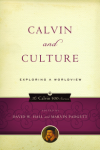 Ed. by David Hall No other Christian teachings in the past five hundred years have affected our Western culture as deeply as the worldview of John Calvin. It extends far beyond the theological disciplines. See more study materials at: www.KennethGentry.com
Ed. by David Hall No other Christian teachings in the past five hundred years have affected our Western culture as deeply as the worldview of John Calvin. It extends far beyond the theological disciplines. See more study materials at: www.KennethGentry.com

Greatness of the Great Commission (by Ken Gentry)
An insightful analysis of the full implications of the great commission. Impacts postmillennialism as well as the whole Christian worldview.
See more study materials at: www.KennethGentry.com
Second, this understanding is allowed by Jesus’ use of the word ethnos and it is actually encouraged by his addition of the means of the discipling: by “teaching them to observe all that I 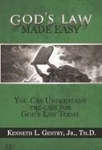 God's Law Made Easy (by Ken Gentry)
God's Law Made Easy (by Ken Gentry)
Greatness of the Great Commission (by Ken Gentry)
An insightful analysis of the full implications of the great commission. Impacts postmillennialism as well as the whole Christian worldview.
See more study materials at: www.KennethGentry.com
">worldview orientation (cp. 2 Cor. 10:4–5).Third, this understanding of ethnos well supplements Jesus’ statement in John 3:17: “God did not send the Son into the world to judge the world, but that the world might be saved through Him.” The kosmos as “a system of men and things” is the goal of the saving work of God in Christ. God did not intend to pluck brands from the fire, but to apply his universal authority (Matt. 28:18) over the whole world. We should note with John Nolland (The Gospel of Matthew: New International Greek Testament Commentary [2005], p. 1270) that “Matthew shares the general Jewish impulse to view true religion as involving a way of life and not simply a pattern of beliefs. So what is to be taught is to keep … what has been commanded.” This is culture-creating.
Thus, I believe all cultures as cultures are to be “discipled,” i.e., brought under Christian instruction and influence. The cultures and the world will be discipled one person at a time, to be sure, but they will be discipled as cultures in all their defining implications.
In the Apostolic church we see the problem of the tendency of Jewish culture (with its ceremonial demands and distinctive social markers) attempting to restrict and govern the gospel (Acts 15; Galatians). This must be overcome — through discipling. The gospel must produce not simply individual converts, but converts governed in all their life relations by the universal authority of Christ.
Participle significance
Regarding the question of the significance of the participles and their functioning as “means,” I believe that these participles are in fact examples of the “participle of means.” As Daniel Wallace notes in his Greek Grammar: Beyond the Basics (p. 629) the “participle of means could be called an epexegetical [explanatory] participle in that it defines or explains the action of the controlling verb.” He adds that “the participle of means is almost always contemporaneous with the main verb.” Thus, the making of disciples is to be done by baptizing and teaching them. He lists Matt. 28:19–20 as examples of the participle of means (p. 630).
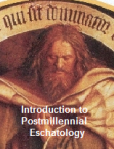
Introduction to Postmillennial Eschatology (10 downloadable mp3 lectures)
by Ken Gentry
Lecture presentations and some classroom interaction. Very helpful definition, presentation, and defense of postmillennialism.
See more study materials at: www.KennethGentry.com
Later on p. 645, Wallace observes regarding the Great Commission participles (baptizing; teaching) that “they obviously make good sense as participles of means; i.e., the means by which the disciples were to make disciples was to baptize and the to teach.” Charles Quarles (Exegetical Guide to the Greek New Testament [2017], p. 352) sees these participles as either participles of means or attendance circumstances (i.e., coordinate with the main verb). R. T. France agrees (The Gospel of Matthew: NICNT [2007], p. 1115), noting that these participles “spell out the process of making disciples.” Davies and Allison (Matthew: International Critical Commentary [1997], p. 686) agree, noting that the “general imperative … is filled out … by what follows: baptism and instruction in obedience.” David L. Turner (Matthew: Baker Exegetical Commentary on the New Testament [2008], p. 689) concurs, noting that the participles explain “how disciples are made.”
As Craig Keener (The Gospel of Matthew: A Socio-Rhetorical Commentary [2009], p. 718) puts it: “one should make disciples for Jesus by going, baptizing, and ‘teaching.’” Craig Blomberg (Matthew: The New American Commentary [1992], p. 431) agrees: “The verb ‘make disciples’ also commands a kind of evangelism that does not stop after someone makes a profession of faith. The truly subordinate participles in v. 19 explain what making disciples involves: ‘baptizing’ them and ‘teaching” them obedience to all of Jesus’ commandments.”
According to Charles Quarles (Exegetical Guide to the Greek New Testament: Matthew [2017]), the aorist imperative of matheteuo “expresses urgency” (p. 351). He also notes that the participles “baptizing” and “teaching” are expressed by the “ptc. of means,” thus implying the understanding of “by.” Though it is not crucial to add “by” to the translation because the statement could be read literally as: “make disciples of all the nations, baptizing them, etc.”
Regarding the statement that the “Aorist imperative form of this verb lends itself to the expression of a simple activity, consider the following (very briefly!). Charles Quarles (Exegetical Guide to the Greek New Testament: Matthew [2017]), notes instead that the presence of the aorist imperative of matheteuo “expresses urgency” (p. 351).
Though he was not postmillennial, A. T. Robertson (Word Pictures in the New Testament, 1:245) speaks of the Great Commission as “the campaign for world conquest.” I believe he has captured the sense of Jesus’ command.
I hope this has been helpful. Keep studying!
 The Beast of Revelation (246pp); Before Jerusalem Fell: Dating the Book of Revelation (409pp); Navigating the Book of Revelation: Special Studies on Important Issues (211pp).
The Beast of Revelation (246pp); Before Jerusalem Fell: Dating the Book of Revelation (409pp); Navigating the Book of Revelation: Special Studies on Important Issues (211pp).
In the Logos edition, these volumes by Ken Gentry are enhanced by amazing functionality. Important terms link to dictionaries, encyclopedias, and a wealth of other resources in your digital library. Perform powerful searches to find exactly what you’re looking for. Take the discussion with you using tablet and mobile apps. With Logos Bible Software, the most efficient and comprehensive research tools are in one place, so you get the most out of your study.
For more study materials, go to: KennethGentry.com
November 8, 2024
PRETERISM, CONCERN, AND CONFUSION
 PMW 2024-086 by Kenneth L. Gentry, Jr.
PMW 2024-086 by Kenneth L. Gentry, Jr.
I recently had a reader, whose name is “AJ,” express his concerns over preterism as presented on my blogsite. His comments were posted about my one-sentence answer to a brief question he asks regarding Revelation 18:3 and the merchants of the earth. Then he responds at length to that one-sentence reply. I will quote his two comments and my replies. Hopefully these will be of interest not only to AJ but to others.
AJ wrote:
“I respectfully have a question I hope you can answer. I have been researching preterism Versus Futurism and have a Litany of questions. But one I would like to ask here would you reference in your aforementioned quote of Revelations Is the merchants who stand Aloft at sea lamenting the destruction of the Great city. I know it goes on to say all of the merchants in Kings of the Earth grew wealthy from her, yet my research into the economic effects of Jerusalem in the first century ad indicate it had a very, very minor role in trade and certainly did not build the wealth of all the merchants and nations of the earth. There were a couple of coastal cities In that region that Much come up much more important for trade, so how can reasonably these verses about Jerusalem making the whole world wealthy be true? Thank you for taking the time to answer my question. God bless you.”
I briefly answered: “The wealth which is especially under view is that of the temple, which had enormous gold stores. These were pillaged by the Romans.” Admittedly, my comment was too brief. But I did not expect a lengthy rejoinder to it. Yet I am glad he wrote back, since I believe he has some issues in his own thinking that needed to be resolved, and that will be helpful for others to consider.
Have We Missed the Second Coming: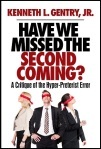
A Critique of the Hyper-preterist Error
by Ken Gentry
This book offers a brief introduction, summary, and critique of Hyper-preterism. Don’t let your church and Christian friends be blindfolded to this new error. To be forewarned is to be forearmed.
For more Christian educational materials: www.KennethGentry.com
To this he responded:
End of AJ’s comment/reply.
Why Not Full-Preterism? by Steve Gregg
This work exposes some of the key flaws in Hyperpreterism by someone who has formally debated them. Much insightful material for those who might be tempted to forsake historic Christian orthodoxy.
For more Christian educational materials: www.KennethGentry.com
The orthodox preterist has two main difficulties in today’s theological discussion.
First, preterism is quite different from the dispensationalism which many Americans (such as me!) have grown up in. Thus, it is boggles the mind of those raised in the dispensational framework. Though dispensationalism arose in the 1880s, many American Christians believe it is ancient, historic orthodoxy.
Second, the other problem is the fact that there is a perversion of preterism that has a large presence on the Internet. This view is known as “hyper-preterism,” though its adherent prefer to call it “consistent” preterism or “full” preterism (even though it is neither consistent nor full). When someone stumbles on the orthodox preterist interpretation of certain passages, they oftentimes begin looking around to find out more about the view. Unfortunately, they stumble into one of the many hyper-preterist websites that begin steering them away from genuine historic orthodoxy. The hyper-preterists do not believe in a future bodily return of Christ, a future bodily resurrection of the dead, a future physically restored new heavens and near earth, nor a future final judgment that brings history to an end and establishes the final, eternal, consummate order wherein righteousness dwells.
This leads me to consider AJ’s lengthy response to my one-sentence answer to his previous question. And his response shows his confusion on matters of preterism. I will give his lengthy answer, but only respond to the most relevant portions.
AJ writes:
“Hmmmm. So the Kings and Merchants of the world DIDN’T mourn over the loss of Jerusalem because they weren’t going to get wealthy anymore, they were actually rejoicing that they were getting wealthier upon its destruction? But only the Roman merchants? It just doesn’t fit.
I just want to point out, brother, that it’s very easy, when putting together a puzzle, to take the pieces that don’t quite fit and trim them so they do. But it doesn’t necessarily complete the puzzle, it still leaves more unanswered questions. I think it’s safe to say, and we all know historically, that the merchants and nations of the world did NOT get wealthy from trade with Jerusalem, neither did they mourn over her destruction because they weren’t going to get wealthy any longer. We have to twist and invert parts of the prophesies to make them match because they say the opposite of what actually happened.
Futurism does the same thing, it tries to trim pieces of the puzzle to make it fit when it doesn’t. I think preterism is closer to the actual truth, but there are so many areas still where they have to trim pieces to make it fit. It’s either that, or they have to admit the Bible lied. But seriously, there’s no amount of metaphor or simile or allegory or symbolism that can make those verses appear to say something different. Either the Kings and Merchants of the world got wealthy from Jerusalem and then mourned her destruction, or they didn’t.
There are so many other things that don’t quite fit, like the fact that Satan and his demons were locked away after Jesus resurrection, yet the apostles were performing exorcisms in the book of Acts, so clearly demons were out and about and active.
And the trampling on Jerusalem until the times of the Gentiles are fulfilled, this is supposed to have been only a month, from August 70 AD to September 70 AD? And then the times of the Gentiles were fulfilled? I mean, wasn’t the times of the Gentiles supposed to be after Jews rejected Jesus? Yet Luke 21 seems to indicate that this doesn’t occur until after the Gentiles trample on Jerusalem. So it’s basically only a month.
And one of the biggest pieces I see that doesn’t fit is turning Genesis chapters 1 through 10 into didactic fiction by claiming there was no original sin, that Adam was somehow created evil. This is what I have heard from many preterists. But the fundamental question, then, is why did Jesus come at all? He was a sacrifice for what? If humans were created sinful and humans are still sinful today, why did God need to wait thousands of years to send a sacrifice for something that never happened, original sin? Without original sin, then nothing really changed spiritually after Christ. We’re still the same now as we were before. Christ didn’t need to sacrifice himself if there’s absolutely nothing his blood washes away because we were allegedly created evil anyway.
There are just many questions unanswered and logical inconsistencies, and preterist have as many different interpretations as futurists do. I can see at its core a fundamental truth in preterism, but whenever questions about specifics arise, nobody can answer them satisfactorily. Every time I go to a preterist website or chat room or social media group, they all tell me a little something different. It’s so confusing, I sometimes doubt if any of this is even real.
Can you understand my concerns here? It’s as if whenever something doesn’t fit, we alter so it does. I mean honestly, the treasures that sat inside the temple had not been making the Roman world wealthy such that the kings and the merchants of the Roman world wept when Jerusalem fell. If anything, that scripture makes it sound like Rome is the one that made the kings and merchants of the earth wealthy. Scripture almost sounds as if it’s describing the subsequent fall of Rome after they destroyed Jerusalem.
Are you completely certain that all of Revelation and all prophecy was basically completed in the reign between Nero and Vespacian? There’s no other times for which we’re waiting?”
Thus endeth the quoting of AJ. Now for my (brief!) reply:
First, confusing the good and the bad
AJ, is clearly confusing hyper-preterism and orthodox preterism. And he shows why he does so, for he states toward the end of his lengthy question: “Every time I go to a preterist website or chat room or social media group, they all tell me a little something different. It’s so confusing.” There’s his problem. You must be careful picking up your theology in an on-line “chat room” or “social media group.” You should study noteworthy writers and their sound, peer-reviewed, published documents to get a proper understanding of the matter. He clearly has been reading hyper-preterists and their strange, unorthodox view of “original sin.”
Second, confusing “the merchants of the earth”
His fundamental concern has to do with my arguing that “the merchants of the earth” have to do with the temple economy in pre-70 Jerusalem. This is because he is not aware of my (and others’) understanding of the phrase “the earth” in Revelation. Most often references to “the kings of the earth” or “the merchants of the earth” are not global statements. Rather, I argue in quite some depth in my commentary (and elsewhere) that the Greek phrase translated “the earth,” can be translated as “the Land,” i.e., “the Land of Israel.” And its should be so translated in Revelation 18.
[image error]Why I Left Full-Preterism (by Samuel M. Frost)
Former leader in Full Preterist movement, Samuel M. Frost, gives his testimony and theological reasoning as to why he left the heretical movement. Good warning to others tempted to leave orthodox Christianity.
See more study materials at: KennethGentry.com
Third, confusing the temple’s wealth
He is surprised that I would suggest that the temple’s wealth is in view in Revelation 18. How could little Israel have an (seemingly) world-dominating wealth under the Roman empire? Actually, we find much evidence that Israel’s temple system was surprisingly wealthy. I cannot deal with all the evidence here, but I would cite just a few sentences from my commentary (vol. 2, p. 1417) which provide a taste of the temple’s wealth that is behind John’s imagery:
“These merchants mourn because ino one buys their cargoes any morei (18:11b). Since Israel’s great wealth was tied to her temple, her trade strength depended on the temple. Titus’s speech to the defeated Jews in Jerusalem declared the beneficence of Rome toward the Jews: iWe have given you leave to gather up that tribute which is paid to God with such other gifts that are dedicated to him; nor have we called those that carried these donations to account, nor prohibited them; until at length you became richer than we ourselvesi (J.W. 6:6:2 §335). The temple, its treasures, and its economic benefit were destroyed in AD 70. The Romans iburnt down the treasury chambers [in the iholy housei], in which was an immense [apeiroi, iunmeasurable, countlessi] quantity of money, and an immense number of garments, and other precious goods there deposited; and, to speak all in a few words, there it was that the entire riches of the Jews were heaped up together [pas ho Ioudaion sesoreuto ploutos], while the rich people had there built themselves chambers [to contain such furniture]” (J.W. 6:5:2 §282).”
In conclusion, I urge readers of preterist literature to make sure you distinguish between preterism and hyperpreterism. And also that you carefully study what orthodox preterism actually says before you attempt to critique it.
The Divorce of Israel: A Redemptive-Historical Interpretation of Revelation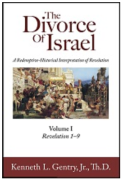
This long-awaited commentary has now been published. It is an 1800 page, two-volume deeply exegetical, academic commentary on the Bible’s most mysterious book.
Click: https://www.kennethgentry.com/the-divorce-of-israel-2-vols-by-gentry-pre-publication-offer/
See more study materials at: www.KennethGentry.com
November 5, 2024
PROPER COMMUNION (5)
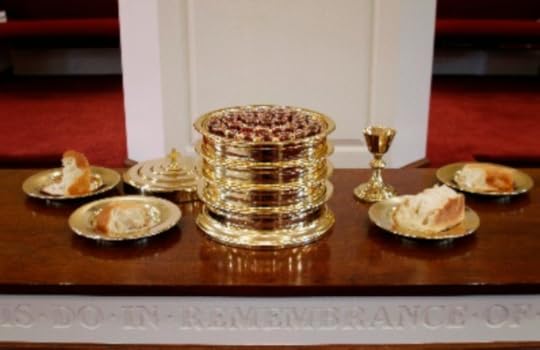 PMW 2024-085 by Kenneth L. Gentry, Jr.
PMW 2024-085 by Kenneth L. Gentry, Jr.
THE NECESSITY AND BENEFITS OF CAREFUL FENCING
In this five-part series, which I am concluding, we have studied the biblical argument for proper fencing of the Lord’s Table. In highlighting that argument we have noted its significance for the integrity of the church as the kingdom of Christ and as a means of establishing the church’s governmental authority. As we reflect upon the matter further we may note the necessity of careful fencing from other angles.
First, the failure to properly fence the Table encourages sin
If we allow Christians who refuse to join a church to partake of the Lord’s Supper we are encouraging them in their sin against Christ and his church. Christ established his church, gave it officers, and appointed (through his apostles) election and ordination as the means for securing its officers. And this can only be done by formal members in a church: electing church officers is surely not open to visitors. And intentionally remaining outside of membership in a local church makes it impossible for believers to “obey your leaders, and submit to them” so that they might “keep watch over souls” (Heb 13:17). Again, as Paul states: he has no authority over those outside (1 Cor 5:12). Obviously Christ intended that his followers formally commit to a church through membership.
Now, we must understand that the new covenant church is rooted in, built upon, and continuous with old covenant Israel (Rom 11:16–18; Eph 2:11–22; Rev 21:12, 14). In fact, Christ’s establishing of the Lord’s Supper itself demonstrates the continuity between the old and new covenant communities (as even our own doctrinal statement declares). After all, Jesus established the Lord’s Supper in the very context of the Passover (Luke 22:15–20), thereby linking the Lord’s Supper with the Passover as its non-bloody fulfillment. Furthermore, he applies the “new covenant” to all partakers of the Lord’s Supper (Luke 22:20; cp. 1 Cor 11:25) even though it was prophesied for Israel: “‘Behold, days are coming,’ declares the Lord, ‘when I will make a new covenant with the house of Israel and with the house of Judah’” (Jer 31:31).
Three Views on the Millennium and Beyond
(ed. by Darrell Bock)
Presents three views on the millennium: progressive dispensationalist, amillennialist, and reconstructionist postmillennialist viewpoints. Includes separate responses to each view. Ken Gentry provides the postmillennial contribution.
See more study materials at: www.KennethGentry.com
When we look into the old covenant regulations governing the Passover we discover that only those who were formally “members” of Israel’s covenant community could partake — and not those who were just members “in their hearts.” Before one could partake the Passover (the old covenant counterpart to the new covenant Lord’s Supper) he must accept circumcision, thereby becoming a member of Israel:
“The Lord said to Moses and Aaron, “This is the ordinance of the Passover: no foreigner is to eat of it . . . . But if a stranger sojourns with you, and celebrates the Passover to the Lord, let all his males be circumcised, and then let him come near to celebrate it; and he shall be like a native of the land. But no uncircumcised person may eat of it.” (Exo 12:43, 48).
Obviously, the foreigner dwelled in Israel among the Jews, for the text states that he “sojourns with you.” As a sojourner living in Israel he was somewhat like one who visits a church but never joins. And just as obviously the foreigner exercised faith in the God of Israel, for otherwise why would he want to partake of the Passover ? After all, it expressly pictured God’s deliverance of Israel from bondage by her exodus from Egypt. In fact, we learn regarding its institution in Exodus 12:
“‘And it will come about when you enter the land which the Lord will give you, as He has promised, that you shall observe this rite. And it will come about when your children will say to you, ‘What does this rite mean to you?’ that you shall say, ‘It is a Passover sacrifice to the Lord who passed over the houses of the sons of Israel in Egypt when He smote the Egyptians, but spared our homes.’” (Exo 12:25–27)
Thus, OT scholars note that “the Exodus was the redemptive event par excellence in the life of God’s covenant people. The Passover reenacted annually the greatest miracle Yahweh performed out of grace for His chosen; it was to become the focal point of Jewish history. The Passover celebration retold the story of freedom after more than four hundred years of Egyptian bondage” (International Standard Bible Encyclopedia2 3:676).
Furthermore, the uncircumcised was not allowed to enter the temple sanctuary to partake of temple sacrificial-feasts, as we learn in Ezekiel’s vision of the eschatological temple:
“And you shall say to the rebellious ones, to the house of Israel, ‘Thus says the Lord God, ‘Enough of all your abominations, O house of Israel, when you brought in foreigners, uncircumcised in heart and uncircumcised in flesh, to be in My sanctuary to profane it, even My house, when you offered My food, the fat and the blood; for they made My covenant void — this in addition to all your abominations. And you have not kept charge of My holy things yourselves, but you have set foreigners to keep charge of My sanctuary.’‘ Thus says the Lord God, ‘No foreigner, uncircumcised in heart and uncircumcised in flesh, of all the foreigners who are among the sons of Israel, shall enter My sanctuary.” (Eze 44:6–9).
But now a problem arises for those who refuse church membership but who want church benefits: Clearly this foreigner’s simply being among the Jews and his having faith (shown by his desire to partake) were not sufficient: he had to take the extra, formal step of becoming a “member” of Israel through circumcision. He had to become “like a native of the land” before he could partake — even though he was racially non-Jewish. Genesis 17:14 warns that to fail to undertake the sign of circumcision results in one’s being cut off from the visible community: “But an uncircumcised male who is not circumcised in the flesh of his foreskin, that person shall be cut off from his people; he has broken My covenant.” Circumcision was an external sign of internal commitment (Deut 10:16; 30:6). By parity of reasoning the same expectations should be true in the New Testament regarding the Lord’s Supper being reserved for baptized members of the church.
But we have more than analogy and historical connection with Israel to direct us in this matter. Scripture teaches that membership in the visible church is an obligation upon all who profess faith in Christ. The church is not an optional society, but an obligatory institution for the Christian. In fact, in Scripture we have grounds for a formal church membership roll, as we may discern from the following:
(1) The concept of a heavenly roll in the Book of Life provides the theological foundation for a church roll (Exo 32:32–33; Dan 12:1; Luke 10:20; Phil 4:3; Rev 13:8; 17:8; 20:12, 15). This is underscored by the OT emphasis on genealogy within Israel (see previous references).
(2) Scripture speaks of members as being “numbered” among others, which reflects the concept of a church roll (Acts 2:41, 47; 6:7; 1 Tim 5:9). Are those who simply visit a church “numbered” in the church? This would mean any and all visitors would be numbered in the church and may therefore vote for church officers and even undertake office themselves. This also strongly implies that those who never attend church are not “numbered” in the church, even though they may profess faith in Christ. This gives new — and erroneous — meaning to the concept of the “invisible” church.
Tongues-speaking: Meaning, Purpose, and Cessation
 by Ken Gentry
by Ken Gentry
The position presented within is that tongues-speaking allowed the gift person to speak in a known human language without previously knowing it; tongues brought inspired revelation from God; the gift was a sign confirming the apostolic witness and warning of the coming destruction of Jerusalem; and therefore the gift ceased in the first century.
See more study materials at: www.KennethGentry.com
(3) Members can be removed from the church (Matt 18:17; 1 Cor 5:2), which surely requires the keeping of a roll so that they might know who is within and who is without its bounds. After all, how can people be removed from a church if they are not members of it? Indeed, Christ promised to establish his church (Matt 16:18) and he gave it “keys” for entering and exiting it (Matt 16:19). These keys involved disciplinary powers whereby people could be removed from it (Matt 18:15–17).
(4) For elder-overseers to formally care for their flock requires that the flock be known, as by a roll (Heb 13:7, 17–18; 1 Thess 5:11–14; 1 Pet 5:2; Acts 20:28). This is especially significant in that officers of the church have no authority over those outside (1 Cor 5:12) which requires that they know who is inside.
(5) The New Testament records instances of letters being written to commend individuals to other bodies, which provides the basis for modern transferring of letters (Acts 18:27; Rom 16:1–2; 2 Cor 8:16–24).
And once again: since God’s word ordains elders in the church (1 Tim 3; Tit 1) who would elect these elders if there were no formally-approved membership? Regular visitors? Occasional visitors? Outsiders? How can its leaders “keep watch over your souls” if there is no membership who must “submit to them” (Heb 13:17) and over whom they are overseers?
By allowing non-members of Christ’s church to partake of his Supper, the church is allowing the theoretical possibility that all professed Christians could avoid church membership. But then where would the church be? If the highest censure of the church is excommunication, but Christians may legitimately avoid being members of the church, then this power is without significance. And if the church had no members over time, no one would have the authority to insure proper doctrine. Christianity would be reduced to a random assortment of personal, competing beliefs and faith claims with no continuity through history.
Furthermore, by not requiring membership in a church for partakers of the Lord’s Supper, we are discouraging professed Christians from coming under spiritual oversight and governmental authority. This allows them to avoid responsibility and accountability — on the basis of our own practice. Thus, this encourages people to sidestep responsibility in the church while they enjoy the benefits of the church. This is ultimately detrimental to their spiritual growth.
From its very institution the Lord’s Supper is a formal, public, corporate act of Christian fellowship, not a personal action unilaterally governed by the individual. Both the integrity and purity of this act of fellowship must be guarded through accountability to a local church. Allowing those who are not formal members of a church to partake involves the church in a strange situation: it welcomes those to partake the Lord’s Supper who voluntarily determine to live in the very place that excommunication casts those who are brought under the church’s severest discipline: outside the church (Matt 18:17; 1 Cor 5:4–5, 12–13)!
To make matters worse, such a tolerance of non-member partaking is detrimental to the life of the church itself. For in principle we effectively undermine all church discipline (which Christ has ordained, Matt 18:17) in that if one may partake the Lord’s Supper without any formal membership in that church, then how shall discipline function? Who exercises discipline? Who is disciplined? Again, Paul says he has no authority over those outside the church (1 Cor 5:12). But this is precisely where non-members dwell.
Second, inefficient fencing encourages individualism, thereby discouraging true Christian society
The Lord’s Supper expresses the unity of the body of Christ: “Since there is one bread, we who are many are one body; for we all partake of the one bread” (1 Cor. 10:17). But those who refuse to join the church and be united with other believers are breaching an important element expressed in the Supper: the Christian’s corporate unity.
Jack Stotts comments:
“Perhaps one of the greatest challenges to the corporate view of the church in the United States, and possibly in the world” is individualism which reflects “a view of the self and community where the community drops away or recedes so far into the background that only the separate and self-reliant individual comes into focus. This self is the individual who has no necessary relationships of mutuality, whose individual accomplishments overshadow the sense of gifts received, where one ‘makes it’ alone or not at all, where consuming goods takes precedence over public responsibility.” (Encyclopedia of Reformed Theology, p. 72)
Presbyterians are opposed to independency. Sadly, our age is a “do-it-my-way” mode of thinking where everyone is his own authority. This does not mesh with a biblical conception of being united with others — and under authority and obligations. The Roman Catholic Church has as one of its major critiques of Protestantism that it has fragmented the church allowing every individual to become a law unto himself. As Presbyterians we should not encourage such. The Christian should be under authority by becoming a vow-taking member of a local church. To fail to warn individual Christians in this regard bows to the rampant individualism in our society.
Sadly, we live in a time and culture where the personal faith of the individual Christian too easily and cavalierly roots out any obligation to his being a member of a body of believers. This erodes covenantal relationships while endorsing self-oriented individualism. Too many evangelicals so emphasize the personal relationship with Christ (which is important, to be sure) that it leads to an individualism detached from any accountability to others. As a logical extension of this way of thinking, the decision to participate in the Lord’s Supper is deemed a matter of purely personal responsibility with no corporate obligations.
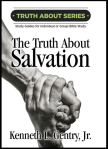 The Truth about Salvation By Ken Gentry
The Truth about Salvation By Ken Gentry
A study guide for personal or small group Bible study. Deals with the Christian doctrine of salvation from a Reformed theological perspective. It opens with a study of God as loving Creator, the shows how the first man fell into sin. Shows God’s righteousness requires that sin be dealt with. Presents Jesus as both God and man so that he can be man’s Savior. Includes review questions and questions for further study.Twelve chapters are ideal for one quarter of Sunday School.
See more study materials at: www.KennethGentry.com
R. Scott Clark rightly warns that:
“Americans (or at least American evangelicals) are an autonomous, egalitarian, rebellious, and independent lot. It is a fundamental assumption of American evangelicals that, having entered into a personal, private relationship with the risen Christ they are entitled to commune in any and every visible, institutional church they will. . . . They consider it their birthright to act as if they are members of all congregations, even if they submit to the discipline of none and certainly not to the congregation where they hope to commune.” (Clark, “Fencing the Table or the Scandal of the Church” (www.heidelblog.wordpress.com).
If we leave the matter of communion solely to the discretion of the unattached individual, we are acting in a spiritually dangerous fashion that can negatively impact not only that individual but the church that allows such individualism. Such a practice assumes an individual’s competence to judge spiritual matters even though he may be a stranger to the teaching of Scripture on communion. Many people today define themselves as Christians without the least biblical understanding of what a genuine Christian is. After all, the Bible warns us that the heart is deceitful and that sin easily confuses men (Jer 17:9; Rom 7:11; 2 Cor 11:3; Eph 4:22; Heb 3:13). Since the Lord’s Supper has a potential for negative sanctions (1 Cor 11:17–34) our obligation as elders is to assist potential partakers in avoiding such sanctions, as well as to keep the Lord’s Supper pure and holy because of what it represents (1 Cor 10:16). Surely we would rather err on the side of caution (if such were error) rather than on the side of openness. Do we want to participate in another’s sin? Our concern involves appropriate, active pastoral care.
What is more, some who profess Christ live in open sin, and yet present themselves as brothers: “if any man that is called a brother be a fornicator, or covetous, or an idolater, or a railer, or a drunkard, or an extortioner; with such an one no not to eat” (1 Cor 5:11). Yet on the individualist principle of communion, such “so called” brothers would be allowed to partake because they are an authority to themselves, lacking any formal, spiritual oversight to challenge, rebuke, correct, instruct, and guide them.
We see in Scripture several occasions in which people came to Jesus professing to be believers. And in their own minds they surely conceived themselves to be believers. But Jesus looked into their hearts and exposed them in their error.
“Now when He was in Jerusalem at the Passover, during the feast, many believed in His name, beholding His signs which He was doing. But Jesus, on His part, was not entrusting Himself to them, for He knew all men, and because He did not need anyone to bear witness concerning man for He Himself knew what was in man.” (John 2:23–25)
“Jesus therefore was saying to those Jews who had believed Him, ‘If you abide in My word, then you are truly disciples of Mine; and you shall know the truth, and the truth shall make you free . . . .’ They answered and said to Him, ‘Abraham is our father.’ Jesus said to them, ‘If you are Abraham’s children, do the deeds of Abraham. But as it is, you are seeking to kill Me’” (John 8:31–32; 39–40)
Thus, when acting on their own, they deemed themselves believers. But Jesus acted in his authoritative capacity to expose their delusion. This is the function of the officers of the church who are also to examine professing believers to see if they are genuine believers (though lacking Christ’s divine insight). We see this in the fact that whenever someone wants to join the church, the officers examine them so that they may properly evaluate their testimony of faith (though we cannot claim Christ’s infallible perception).
What if a Mormon came to a church that did not engage in fencing the table? He is a member of the Church of Jesus Christ, Latter-day Saints, which has as its distinctive apologetic an “apologetic of the heart.” This Mormon would vehemently claim that he “believes” in Jesus. Yet we should immediately recognize that we cannot allow a Mormon to partake of communion (he is a polytheist with horribly corrupt, heretical views of God and Christ). What if a Roman Catholic came as professing believer? But if we should forbid a cult member or a Roman Catholic, then we have fenced the table. We have fenced the table the table by forbidding cultic or heretical doctrine and adherents to that cultic or heretical doctrine.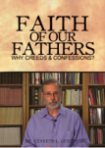
Faith of Our Fathers (DVDs by Ken Gentry)
Explains the point of creeds for those not familiar with their rationale.
Also defends their biblical warrant and practical usefulness for defending historic, Christian orthodoxy in our heterodox world.
See more study materials at: www.KennethGentry.com
Third, by not giving a word of fencing, we undermine discipline in the church
If we do not state that those who have been subjected to discipline should not partake, then we actually undermine the legitimacy of church discipline. We do this in allowing someone who has been disciplined in his local church (or disciplined out of his local church by excommunication) to partake of the Lord’s Supper in ours. This is spiritually dangerous, for if we leave it to a visitor’s uninformed, uninstructed , or even seared (1 Tim 4:2) conscience to decide whether he should partake, he may not understand the significance of what he is doing. (Of course, we recognize that even in our attempt at fencing the table we cannot stop the determined non-regenerate false-professor of Christ from partaking — because we lack Christ’s perfect knowledge.)
Fourth, the problem of baptized children
If we do not fence the table by requiring formal, communicant status membership (our fencing statement reads: “those who have been approved by church officers”): What about our young children who have not met with the elders to be approved for communicant status? May they determine that they are believers and partake, though not yet admitted to the Table by the elders? Such is the logic of opposition to fencing the table in terms of formal church membership.
CONCLUSION
The purpose of this study was to present, explain, and defend a four-fold fencing statement. In brief, our fencing statement requires that a participant in the Lord’s Supper must be:
1. a believer in Christ
2. baptized in his name
3. a member in good standing of an evangelical church
4. formally admitted to the Lord’s Table by ordained church officers of an evangelical church.
This fencing effort is important because Reformed Christians deeply believe: “Is not the cup of blessing which we bless a sharing in the blood of Christ? Is not the bread which we break a sharing in the body of Christ?” (1 Cor 10:16).
Click on the following images for more information on these studies:



November 1, 2024
PROPER COMMUNION (4)
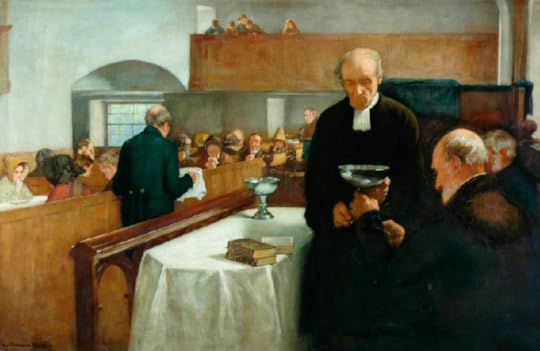 PMW 2024-084 by Kenneth L. Gentry, Jr.
PMW 2024-084 by Kenneth L. Gentry, Jr.
In my previous article on fencing the table I laid the foundations for considering the question before us. I introduced the idea of sacramental foundations their implications for fencing the table. Then I focused on the relationship of the sacraments to church government. Now we are finally ready to deal with the specific matter of partaking Communion.
SACRAMENTAL PARTAKING
Now I will draw out some biblical principles and directives regarding the careful fencing and partaking of the Lord’s Table.
First, the Lord’s Supper is intrinsically corporate
Although personal responsibilities fall upon the individual partakers of the Lord’s Supper (see next point below), we see clear and fundamental community overtones in it. Note the following:
(1) As I begin with these observations, we must remember that the first Lord’s Supper was established in the context of the Passover and took the place of a communal meal. Communion was designed to take the Passover’s place within the new Israel of God, the Church of Jesus Christ. This fact provides helpful background insights into the corporate setting and obligations of the sacrament.
The initial Passover was partaken in the houses of the Jews while still in Egypt and just before their exodus from bondage: “they shall take some of the blood and put it on the two doorposts and on the lintel of the houses in which they eat it” (Exo 12:7). This at-home partaking was necessary in light of the original circumstances of that Passover: Israel was not yet organized as a nation and the last plague on Egypt was fast approaching: “The blood shall be a sign for you on the houses where you live; and when I see the blood I will pass over you, and no plague will befall you to destroy you when I strike the land of Egypt” (Exo 12:13).
Nevertheless, even in those circumstances the Passover was a communal celebration designed for the corporate body of Israel. We see this in that all of the Jews in their various homes were simultaneously to slay their Passover lambs; hence we read: “the whole assembly of the congregation of Israel is to kill it at twilight” (Exo 12:6). In fact, in the Exodus 12 legislation itself we read of directives for future (post-Egypt) celebrations which show its formal, corporate, communal nature as over against any individualistic conception: “On the first day you shall have a holy assembly [i.e., gathering together] and another holy assembly on the seventh day; no work at all shall be done on them, except what must be eaten by every person, that alone may be prepared by you” (Exo 12:16).
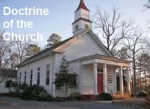 Christ’s Church (20 mp3 downloads)
Christ’s Church (20 mp3 downloads)
by Ken Gentry
An in-depth sermonic presentation of the doctrine of the church. This is vitally important today with the evangelical church not living up to its biblical calling
See more study materials at: www.KennethGentry.com
Furthermore, we must understand that the Passover celebration was not simply for a mass of individuals partaking simultaneously, but for the formal, organized body of Israel as such. The Passover directive clearly stated: “This is the ordinance of the Passover: no foreigner is to eat of it” (Exo 12:43). One had to be a “member” of Israel in order to partake with the assembly of Israel. In the next few verses we discover the remedy that allows for foreigners to partake the Passover: a foreigner may eat of it, if he “joined” Israel by entering into “membership” in Israel by means of circumcision: “But if a stranger sojourns with you, and celebrates the Passover to the Lord, let all his males be circumcised, and then let him come near to celebrate it; and he shall be like a native of the land” (Exo 12:48).
We see the concept of “membership” in Israel and even a “fencing” of the Passover in the following. Any Jew who neglected the Passover was to be “cut off from his people”: “The man who is clean and is not on a journey, and yet neglects to observe the Passover, that person shall then be cut off from his people, for he did not present the offering of the Lord at its appointed time. That man shall bear his sin” (Num 9:13). The very idea of being “cut off” demands that one first be a “member” of the body of Israel.
(2) Eventually, after Israel was established as a nation and settled in the land, the Passover was to be celebrated corporately in Jerusalem (rather than individually in personal homes). This further demonstrates the formal, communal nature of the sacrament: “You are not allowed to sacrifice the Passover in any of your towns which the Lord your God is giving you; but at the place where the Lord your God chooses to establish His name [i.e., Jerusalem], you shall sacrifice the Passover in the evening at sunset, at the time that you came out of Egypt” (Deut 16:1, 5–6; cp. 2 Chron 30:5, 13, 15; 35:1; etc.). The Passover (also known as the Feast of Unleavened Bread) was to be celebrated only in a “holy convocation” or worship assembly: “Then on the fifteenth day of the same month there is the Feast of Unleavened Bread to the Lord; for seven days you shall eat unleavened bread. On the first day you shall have a holy convocation; you shall not do any laborious work” (Lev 23:6–7). Clearly the Passover was not intended to be an individualistic, in-home sacrament, for it could be partaken only in Israel’s center of worship simultaneously with the mass of Israel in a holy convocation.
(3) Much later in Jesus’ own day the Passover continued to be celebrated corporately in a central location in Jerusalem. We read in Luke 2:41 that Jesus’ “parents used to go to Jerusalem every year at the Feast of the Passover” (cp. John 2:13, 23; 11:55). In fact, Jesus planned his final Passover in Jerusalem with his disciples: “He said, ‘Go into the city to a certain man, and say to him, “The Teacher says, ‘My time is at hand; I am to keep the Passover at your house with My disciples’” (Matt 26:18; cp. Mark 14:14; Luke 22:11). At this final communal Passover of Jesus’ ministry, he establishes the Lord’s Supper with his disciples, desiring to eat it with them gathered together (Luke 22:15–21).
From these first three points we may surmise by “good and necessary consequence” (WCF 1:6) that some sort of roll or registration was necessary for partaking the Passover:
(a) We see this in specific requirements regarding Passover lambs: The Jews were commanded to prepare only an exact amount of Passover lambs according to how many should eat: they must take a lamb “according to the number of persons in them; according to what each man should eat” (Exo 12:3–4). This is very important in that they must not “leave any of it over until morning” (Exo 12:10).
 Dispensational Distortions (3 downloadable mp3s)
Dispensational Distortions (3 downloadable mp3s)
by Ken Gentry
Reformed introduction to classic dispensationalism, with analysis of leading flaws regarding the Church, kingdom, redemptive history, and Christ. Helpful for demonstrating errors to dispensationalists.
See more study materials at: www.KennethGentry.com
(b) We see this in the general importance of formal genealogies in Israel: formal genealogies were carefully kept among the Jews, until they were destroyed at the collapse of the temple in A.D. 70. One examples of these genealogies is found in the registering of priests and their families (2 Chron 31:17–18). We see the importance of genealogies throughout Israel’s history in genealogies in 1Chronicles 5 and as well as Matthew 1. In Matthew 1 Jesus’ genealogy is given and includes not only biological Jews but non-Jews who became part of (“joined”) Israel (e.g., Gentiles Tamar, Rahab, Ruth, and Bathsheba, Matt 1:3, 5, 6). Ultimately though, the foundational image of formal registration is God’s “book” (e.g., book of life) which speaks of persons either being registered in it (Isa 4:3; Dan 12:1; Mal 3:16; cp. Rev 21:27) or deleted from (Exo 32:32; Psa 69:28; cp. Rev 3:5).
(c) We see this in the general practice in which one may be formally “cut off” from Israel: for instance, particular legislation prohibited production of the special priestly anointing oil: “whoever shall mix any like it [special holy anointing oil, vv. 31–32], or whoever puts any of it on a layman, shall be cut off from his people” (Exo 30:33, 38; cp. Lev 7:20–21, 25, 27; 17:14; etc.).
(d) We see this in the particular legislation which allowed or excluded persons from partaking the Passover in Israel. Earlier we saw that a newly-received foreigner could be allowed access to the Passover by undergoing Israel’s initiation rite, circumcision (Exo 12:48; see above). Not only so but a circumcised Jew (a member of Israel) could be “cut off” from Israel for either breaching Passover (the Feast of Unleavened Bread) regulations or intentionally neglecting to partake of Passover:
“Seven days you shall eat unleavened bread, but on the first day you shall remove leaven from your houses; for whoever eats anything leavened from the first day until the seventh day, that person shall be cut off from Israel.” (Exo 12:15)
“Seven days there shall be no leaven found in your houses; for whoever eats what is leavened, that person shall be cut off from the congregation of Israel.” (Exo 12:19)
“But the man who is clean and is not on a journey, and yet neglects to observe the Passover, that person shall then be cut off from his people, for he did not present the offering of the Lord at its appointed time. That man shall bear his sin.” (Num 9:13)
(e) We see this in the prohibition of certain Jews from the formal “assembly of the Lord” in worship. In Deut 23:2 God’s Law ordains that “no one of illegitimate birth [Heb.: mamzēr] shall enter the assembly of the Lord; none of his descendants, even to the tenth generation, shall enter the assembly of the Lord.” This requires some sort of roll in order to determine the eleventh generation so that these may enter.
(4) Paul speaks of the Lord’s Supper as a corporate reality: “Since there is one bread, we who are many are one body; for we all partake of the one bread” (1 Cor 10:17). Thus, the Supper reflects the corporate one body composed of many members.
(5) Paul highlights the corporate sharing in the Lord through the Supper rather than an individualistic phenomenon:
“Is not the cup of blessing which we bless a sharing in the blood of Christ? Is not the bread which we break a sharing in the body of Christ?” (1 Cor 10:16).
The idea of “sharing” (Gk.: koinonia) suggests mutual, communal sharing together in Christ. In Acts 2:44 and 4:32 we learn that the first-century church communally shared (Gk.: koinos) their property. Paul uses the Greek verb koinoō in 2 Cor 6:14 and 8:4, which verses speak of inter-body sharing. Thus, regarding the Lord’s Supper, Christ’s corporate body (the church) shares together in the Lord.
 Prophecy Studies (4 downloadable mp3s)
Prophecy Studies (4 downloadable mp3s)
by Ken Gentry
Dispensationalism dominates the evangelical market regarding eschatological discussions. But dispensationalism is radically mistaken regarding the eschatology of Scripture. In this series not only is dispensationalism analyzed, but also the postmillennial eschatology of the Psalms, and a preterist analysis of Revelation.
See more study materials at: www.KennethGentry.com
(6) Paul notes that the church as a body has been experiencing difficulties because of the abuse of the
Supper: “For this reason many among you are weak and sick, and a number sleep. But if we judged ourselves rightly, we should not be judged” (1 Cor 11:30–31). The plural “ourselves” suggests an organic conception of the church which is suffering because of widespread abuse of the sacrament.
Second, the Lord’s Supper engages self-examination
The fact of Paul’s urging individual self-examination suggests to some Christians that this is the sole requirement of the Supper: an individual’s personal right without reference to notion of corporate responsibility included. Paul certainly gives directives regarding individuals partaking:
“whoever [Gk.: hos, singular relative pronoun] eats [esthie, singular verb] the bread or drinks the cup of the Lord in an unworthy manner, shall be [estai, singular verb] guilty of the body and the blood of the Lord. But let a man [anthrōpos, singular] examine [dokimazetō, singular verb]] himself [heauton, singular], and so let him eat [esthietō, singular verb] of the bread and drink of the cup. For he who eats and drinks [esthiōn kai pinōn, singular verbs] judgment to himself if he does not judge [diakrinōn, singular participle] the body rightly” (1 Cor 11:27–29).
But we must understand that Paul was writing to a church — not to individuals, not to a Timothy or a Titus regarding their own personal communion. He is giving directions to the church at Corinth regarding its own members and their participation in the supper. Thus, the individuals deserving rebuke were already accountable to a church and its officers. Remember that Paul is rebuking the church for not governing its members properly, noting that he had nothing to do with those outside (1 Cor 5:1–13).
Therefore, these are obviously inside the church and consequently are members under the authority of its elders (cp. 1 Pet 5:2; Heb 13:17; 1 Tim 3:5). He is pressing the additional obligation of self-examination upon individual members while they participate in the corporate administration of the Supper. The Lord’s Supper is not a formalistic ritual to be taken thoughtlessly by rote. The passage warns of the necessity of thoughtful and reverential participation, not open participation unguarded by the officers of the church.
Third, forbidding from the Lord’s Table believers who are not members of a church does not preclude their spiritually feeding on Christ
Some Christians complain that to bar partaking the Lord’s Supper to a believer in Christ who is not a member of a local church bars him from communion with Christ. However, note the following:
In the first place, the problem is easily solved by simply joining a church. This is, after all, an obligation for believers that church officers should promote (see brief statement below on the biblical obligation to church membership). In the second place, Christians may feed upon Christ spiritually even apart from the sacrament. Any person may individually feed upon Christ spiritually in his heart at any time — as he prays, meditates on Scripture, worships, and so forth. We see this in Jesus’ general, public statement in John 6:54: “He who eats My flesh and drinks My blood has eternal life, and I will raise him up on the last day.” This eating and drinking language speaks of taking Christ into one’s life, that is, it involves believing in Christ: “Jesus said to them, ‘I am the bread of life; he who comes to Me shall not hunger, and he who believes in Me shall never thirst’” (John 6:35).
Thine Is the Kingdom
(ed. by Ken Gentry)
Contributors lay the scriptural foundation for a biblically-based, hope-filled postmillennial eschatology, while showing what it means to be postmillennial in the real world.
See more study materials at: www.KennethGentry.com
As those who love the Church of our Lord Jesus Christ, our concern should be: why would someone who professes Christ not want to join the visible church? If he is a believer why does he not want to come under the authoritative oversight of the local church and its God-ordained officers? And if he does not want to join the visible church and come under its God-ordained authority, why is he concerned to partake of the church’s visible sacrament?
Stay tuned. I will present my fifth and final article on communion in my next article.
Click on the following images for more information on these studies:


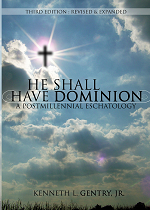
October 29, 2024
PROPER COMMUNION (3)
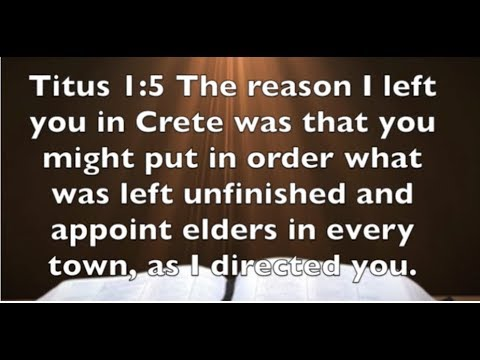 PMW 2024-083 by Kenneth L. Gentry, Jr.
PMW 2024-083 by Kenneth L. Gentry, Jr.
This is the third in a five-part series. The reader should read the first two articles to understand what I am getting at in this one. So, in this one, let us consider:
COMMUNION AND CHURCH GOVERNMENT
Several questions arise as we consider this issue:
• To whom was the Lord’s Supper originally given?
• In what context may it be offered?
• Who may administer it?
Answering these inter-related questions will take us a long way toward demonstrating the third and fourth elements in our fencing statement. Those elements require that a participant be a member in good standing (i.e., not under discipline) of an evangelical church and that they must have been formally admitted to the Lord’s Table by ordained church officers from an evangelical church (they may not be baptized infants who have not given a credible profession of faith, nor may baptized children approach the Table solely on their own decision without being formally approved by church officers). Let us see how this is so.
First, the Lord’s Supper was given to the visible church
To demonstrate this we must begin by considering the original establishment of the Supper.
Jesus instituted the Supper as a tangible, visible sign of his new covenant. It is not a wholly spiritual transaction, such as exercising faith in him which incorporates one into the invisible church. Rather the Supper involves both spiritual and physical aspects, internal disposition and external operations: it employs visible, material elements (the bread and the cup) and requires external, physical actions (taking, eating, drinking). Note the following in this regard, focusing particularly on the italicized statements:
“And when He had taken a cup and given thanks, He said, Take this and share it among yourselves; for I say to you, I will not drink of the fruit of the vine from now on until the kingdom of God comes. When He had taken some bread and given thanks, He broke it, and gave it to them, saying, This is My body which is given for you; do this in remembrance of Me. And in the same way He took the cup after they had eaten, saying, This cup which is poured out for you is the new covenant in My blood.” (Luke 22:17–20)
[image error]For more information and to order click here.
" data-image-caption="" data-medium-file="https://postmillennialworldview.com/w..." data-large-file="https://postmillennialworldview.com/w..." class="alignright size-full wp-image-495" src="https://postmillennialworldview.com/w..." alt="" />God Gave Wine (by Ken Gentry)
A biblical defense of moderate alcohol consumption. Considers all key biblical passages and engages the leading objections.
See more study materials at: www.KennethGentry.com
Paul reiterates this as he records Christ’s institution of the Supper and relates it to the Corinthian church:
“For I received from the Lord that which I also delivered to you, that the Lord Jesus in the night in which He was betrayed took bread; and when He had given thanks, He broke it, and said, “This is My body, which is for you; do this in remembrance of Me.” In the same way He took the cup also, after supper, saying, “This cup is the new covenant in My blood; do this, as often as you drink it, in remembrance of Me.” 1 Cor 11:23–25
Without these visible elements and external actions there is no Lord’s Supper. These are essential to the sacrament as a sacrament which is a visible sign of the new covenant designed to “put a visible difference between those that belong unto the Church and the rest of the world” (WCF 27:1). Such visible signs and external actions demonstrate that it was designed for the visible church, the historical church formally and publically organized as a body.
Second, the Lord’s Supper operates within the gathered visible church
Paul speaks of the Lord’s Supper in the context of its public worship in the corporate gathering of the visible church. No verse in Scripture ever hints at its private administration by individuals or in a family context. It is always administered under church authority.
Paul provides the fullest treatment of the Lord’s Supper in Scripture in 1 Corinthians 10–11. There we discover evidence of the corporate setting and formal administration of the sacrament. In fact, as Paul discusses the Supper he even speaks of it in the context of and as a function of the church’s formal gathering together — thereby demonstrating the corporate nature of the visible church:
“Since there is one bread, we who are many are one body; for we all partake of the one bread” (1 Cor 10:17)
“you come together” (1 Cor 11:17)
“when you come together as a church” (1 Cor 11:18)
“when you meet together” (1 Cor 11:20)
“when you come together to eat” (1 Cor 11:33).
One of the preceding references even rebukes the Corinthians for abusing the Lord’s Supper in their particular church setting: “when you meet together, it is not to eat the Lord’s Supper” (1 Cor 11:20). Of course, he is not saying they are not physically eating the Lord’s Supper, for they most clearly are (1Cor 11:23–26). In fact, their use (abuse!) of the Supper is the main issue which Paul confronts here. He is denouncing their attitude during its administration and their manner of partaking it: they are not approaching it reverentially as the Lord’s Supper. He complains: “What shall I say to you? Shall I praise you? In this I will not praise you” (1 Cor 11:22).
God’s Law Made Eas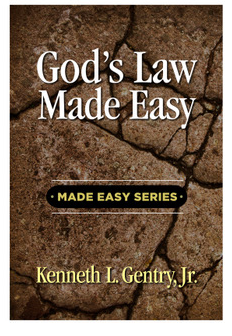 y
y
(by Kenneth Gentry)
Summary for the case for the continuing relevance of God’s Law. A helpful summary of the argument from Greg L. Bahnsen’s Theonomy in Christian Ethics.
See more study materials at: www.KennethGentry.com
Third, the Lord’s supper was entrusted to the officers of the visible church
The physical elements (the bread and the cup) and the external manner (the sacramental actions) were appointed by Christ and immediately entrusted to the foundational officers of his church, the apostles: “and when the hour had come He reclined at the table, and the apostles with Him” (Luke 22:14). Paul teaches that the church is “built upon the foundation of the apostles” (Eph 2:20a; cp. Rev 21:14). True, the apostolic foundation of the church obviously involves both the invisible and visible dimensions of the new covenant phase of the church. But this sacrament is so constituted as necessarily linking it to the visible church because of the external, visible realities of the tangible elements and the sacramental actions. No one may arrogantly commune spiritually with Christ or sinfully enter into the invisible church, but they certainly can and often do arrogantly partake physical communion within the visible church.
In this regard we must observe that the Lord did not indiscriminately give the Lord’s Supper to individuals or even to collected masses of individuals — which we might expect if it were an individual, personal matter for people’s own performance. For instance, he did not institute it at the feeding of the 5000 and then instruct them: “Go thou and do likewise.” This is all the more noteworthy in that after feeding the 5000 (John 6:1–14) he stated a spiritual truth that reminds us of the spiritual implications of the Supper: “He who eats My flesh and drinks My blood has eternal life, and I will raise him up on the last day” (John 6:54).
Nowhere do we read that Jesus ever instructed random followers: “If I then, the Lord and the Teacher, served you my Supper, you also ought to serve it to one another. For I gave you an example that you also should do as I did to you” (cf. John 13:14–15). Rather, he entrusted the Lord’s Supper to the foundational officers of his church as under their authoritative oversight.
Thus, the Lord’s Supper differs greatly from a spiritual feeding upon. Any person may individually feed upon Christ spiritually in his heart at any time thereby providing him entry into the invisible church. We see this in Jesus’ general, public statement in John 6:54: “He who eats My flesh and drinks My blood has eternal life, and I will raise him up on the last day.” But the Lord’s Supper involves physical actions in a corporate context, was originally instituted with the first officers of the church, and is therefore a function of the visible church which is entrusted to its officers.
Fourth, the Lord’s Supper exercises the highest function of “the keys of the kingdom”
This is an important issue that will directly demonstrate and theologically explain our third (good-standing membership) and fourth (formal admission) fencing elements. Let us see how this is so.
In Matthew 16 Jesus spoke to Peter and through him to the twelve apostles (Matt 10:1–2) who were gathered before him (Matt 16:13, 20, 21). He stated: “I will give you the keys of the kingdom of heaven; and whatever you shall bind on earth shall be bound in heaven, and whatever you shall loose on earth shall be loosed in heaven” (Matt 16:19). Here the Lord highlighted the church’s ultimate power over its members: its formal, judicial, spiritual power to open or to shut the kingdom of God to men, that is, to include or exclude persons from the church. The keys are not given indiscriminately to individual Christians based on their faith in Christ; they are given to its original officers as officers.

Greatness of the Great Commission (by Ken Gentry)
An insightful analysis of the full implications of the great commission as given in Matthew 28:18-20. Impacts postmillennialism as well as the whole Christian worldview.
See more study materials at: www.KennethGentry.com
We must note that the power of wielding the keys of the kingdom is only spiritual; spiritual authority is the only power the church possesses. The church has not been granted the right to administer punishments of a corporal (e.g., flogging), capital (i.e., execution), or pecuniary (i.e., fines) nature. God has ordained three major institutions in the world, with differing ultimate powers: God’s Law gives to the civil magistrate the “sword” to enforce the laws of the state (Rom 13:4) and to the home the “rod” to enforce the laws of the family (Prov 13:24). But the church officers are given the spiritual “keys” to enforce the laws of the church (Matt 16:19).
The Lord illustrates the use of the keys in his famous statement on church discipline:
“And if your brother sins, go and reprove him in private; if he listens to you, you have won your brother. But if he does not listen to you, take one or two more with you, so that by the mouth of two or three witnesses every fact may be confirmed. And if he refuses to listen to them, tell it to the church; and if he refuses to listen even to the church, let him be to you as a Gentile and a tax-gatherer. Truly I say to you, whatever you shall bind on earth shall be bound in heaven; and whatever you loose on earth shall be loosed in heaven.” (Matt 18:15–18; cp. Tit 3:10)
This spiritual process of disciplinary interaction begins informally and privately, and does not necessarily result in formal, public church discipline. But its final stage, its highest action — involving no pecuniary fine, no physical punishment, no capital sanction — is engaged by and only by “the church.” This is not an action of the home or the state — nor even of the individual.
By the very nature of the case “the church” in this context must mean the local manifestation of the visible church — for how shall discipline be brought before the universal visible church? And more particularly “the church” must mean the local church’s governmental authorities, the church functioning through its officers. Elsewhere in Scripture the church officers are the ones entrusted with the power of formal church discipline: “Obey your leaders, and submit to them; for they keep watch over your souls, as those who will give an account” (Heb 13:17). They are the ones who are to “shepherd the flock of God” (1 Pet 5:2). The elders/overseers are the ones who are called to manage the church of God much like a father manages his own household (1 Tim 3:1, 6; cp. Tit 1:7–9). Church elders are called “overseers” because of this sort of oversight function, as we see in Acts 20 where Paul calls together the “elders of the church” (Acts 20:17) then refers to them as “overseers” (Acts 20:28).
Individuals and non-church bodies (e.g., local Bible study groups, Christian schools, Christian societies, etc.) do not hold the keys of the kingdom. The keys represent official governmental powers reserved solely for the church operating under Christ as the visible manifestation of the kingdom of God and through its ordained officers as an exercise of Christ’s kingdom-authority. The Table in the Lord’s Supper is “the table of the Lord” (1 Cor 10:21) just as the kingdom of heaven is his. And Christ organizes his kingdom-church as a government under duly gifted, called, approved, elected, ordained, and installed officers. Not just anyone claiming the name of Christ may exercise this highest power of the church in accepting and excluding persons from the church and the Supper — nor even for themselves, otherwise church government would be superfluous.
Paul rebukes the Corinthian church for failing to exercise the keys of the kingdom in removing an unrepentant sinner from their midst. As one of the highest officers of the church possessing a plenary power (i.e., a power beyond the local church body), the Apostle Paul (1 Cor 1:1; 9:1) writes:
“In the name of our Lord Jesus, when you are assembled, and I with you in spirit, with the power of our Lord Jesus, I have decided to deliver such a one to Satan for the destruction of his flesh, that his spirit may be saved in the day of the Lord Jesus.” (1 Cor 5:4–5)
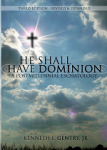
He Shall Have Dominion
(paperback by Kenneth Gentry)
A classic, thorough explanation and defense of postmillennialism (600+ pages). Complete with several chapters answering specific objections.
See more study materials at: www.KennethGentry.com
Here Paul is speaking of a formal, judicial action against the unrepentant church member: it is done “in the name [i.e., under the authority] of our Lord Jesus,” by the “assembled” (formally gathered) body of Christ which exercises “the power of our Lord Jesus” (cp. Matt 18:18–20). This action removes the unrepentant sinner from membership in the church which places him outside the kingdom of Christ and into the kingdom of Satan (“deliver such a one to Satan,” 1 Cor 5:5a), which is the only other spiritual sphere (cf. Acts 26:18; Col 1:13), in that people are either saved or not, in the kingdom or not.
Admittedly Paul does not expressly mention elders in 1 Corinthians 5. In fact, he nowhere mentions “elder” or “overseer” anywhere within the whole Corinthian corpus — nor do we see elders mentioned in Acts 18 where we read about his founding the Corinthian church. Nevertheless, we may by good and necessary consequence deduce that the church had elders who were to function as agents of discipline and who were being directed here to excommunicate this sinner. Consider the following:
(1) Paul established the church at Corinth and stayed among them for eighteen months (Acts 18:11). It is his stated practice always to ordain elders for the churches he established (Acts 14:23; Tit 1:5). After eighteen months at Corinth, he surely would have installed elders there.
(2) In the historical record of his church work at Ephesus, we see him calling the elders at Ephesus to “oversee” the work (Acts 20:17, 28) and to protect the church from spiritual harm (Acts 20:29–32). He surely would have the same concern and expect that same pattern of spiritual oversight and action at Corinth. After all, he lovingly informs them: “For if you were to have countless tutors in Christ, yet you would not have many fathers; for in Christ Jesus I became your father through the gospel” (1 Cor 4:15).
(3) Here at Corinth the church’s officers obviously failed to act as “leaders” who “watch over . . . souls” (Heb 13:17). They failed to “shepherd the flock of God” by “exercising oversight” (1 Pet 4:2). We see this in his complaint: “you have become arrogant, and have not mourned instead, in order that the one who had done this deed might be removed from your midst” (1 Cor 5:2).
(4) For the good of the church, therefore, Paul states that he himself has “decided to deliver such a one to Satan for the destruction of his flesh” (1 Cor 5:5a). He expects the church officers to follow his directive, for he clearly commands them: “clean out [Gk.: ekkatharate, aorist active imperative] the old leaven” (1 Cor 5:7a) and “remove [Gk.: exarate, aorist active imperative] the wicked man from among yourselves” (1 Cor 5: 13b). He urges this action for the good of the church: otherwise “a little leaven leavens the whole lump” (1 Cor 5:6b). He had instructed the church in a previous letter “not to associate with immoral people” (1 Cor 5:9), but they did not obey. Now they must.
[image error]For more information and to purchase click here.
" data-image-caption="" data-medium-file="https://postmillennialworldview.com/w..." data-large-file="https://postmillennialworldview.com/w..." class="alignright size-full wp-image-213" src="https://postmillennialworldview.com/w..." alt="Predestination Made Easy" />Predestination Made Easy
(by Ken Gentry)
A thoroughly biblical, extremely practical, and impressively clear presentation of
the doctrine of absolute predestination.
See more study materials at: www.KennethGentry.com
So then, Paul’s recommended formal action would close the Lord’s Table to a member of the church because that one is no longer deemed a believer but only a “so-called brother” (Gk.: adelphos onomazonmenos, “one called a brother,” 1 Cor 5:11). This is important for our consideration: this person is being removed even though he may personally claim to be a believer (again: note that Paul calls him a “so-called brother”) and even though he continues coming to the church. This parallels those in John 8:30–31 who claimed to be believers: “As He spoke these things, many came to believe in Him. Jesus therefore was saying to those Jews who had believed Him.” The first reading of John’s text seems to present these persons as true believers. Yet we learn from John 8:37, 42, 44 that they were not true believers, despite their apparent confession of faith (see also the situation in John 2:23–25). Indeed, they desired even to kill Jesus (John 8:40).
Furthermore, we must note that Paul even declares that he himself cannot exercise this church power upon “those who are outside” for only “God judges” them (1 Cor 5:13a). Thus, his authority is confined to the sphere of the church. The Corinthians therefore must “remove the wicked man from among yourselves” (1 Cor 5:13b). This is a power of the church over its members; it is not a plenary power of individuals or even the church itself over those outside of its bonds. Church authority has no bearing on outsiders; outsiders are beyond the sphere of the church’s governmental authority.
Fifth, the church’s disciplinary power is exercised only through the church’s officers
As Reformed Christians we believe that Christ establishes and organizes his church as a kingdom. We also hold that as an orderly kingdom the church has duly-appointed officers to exercise its governmental powers in order to maintain its integrity. The right to exercise church discipline devolves upon those who are properly gifted and formally ordained (Acts 14:23; 1 Tim 4:14; 5:22; 2 Tim 1:6) to exercise those gifts. Paul teaches that some have the requisite gift to lead, not all (Rom 12:8c). He teaches that some Christians have gifts to administer the church, not all (1 Cor 12;28–30). Some are appointed as overseers (elders) in the church, not all (1 Tim 3:1–7; Tit 1:5). Therefore, the exercise of the church’s kingdom power is entrusted to and exercised only by some, not all. That is, the church’s power is granted to those who are properly gifted and appointed, the church’s elders. Disciplinary power is not exercised by the congregation at large, for this would involve young communicant children who not have the requisite biblical knowledge and spiritual maturity to faithfully engage disciplinary process.
The highest officers of the church were the foundational apostles (Matt 16:17–19; Eph 2:20). The apostles were also “elders” of the church, for the apostleship embodied all the offices, functions, and powers of the church in their unique, foundational, inspired calling and ministry. For instance, the Apostle Peter writes: “I exhort the elders among you, as your fellow elder” (1 Pet 5:1). So then, by establishing in Scripture the distinctives and prerequisites of formal church office (1 Tim 3:1–7; Tit 1:5–9), by ordaining elders in first-century local churches (Acts 14:23; Tit 1:5), by including them in joint decisions with the apostles themselves (Acts 15:6, 22–23; 16:4), and by endorsing (Acts 11:30; 20:17, 28, 32, 36; 1 Tim 5:17; Jms 5:14; 1 Pet 5:1) and defending governing authority under elders (1 Tim 5:19; Heb 13:17), the apostles pass on those particular non-inspired official powers of church office to its elders in order to maintain church government in the on-going church beyond the apostolic era.
Thus, the formal, governmental authority which Christ gave to his unique, first-century apostles is passed on by them through the laying-on-of-hands (Acts 14:23; 1 Tim 4:14; 5:22; 2 Tim 1:6; Tit 1:5). Through this means the ongoing elders of the living church have authority vested in them ultimately from Christ and through his apostles for continuing the power of discipline. Those entrusted with the keys to govern Christ’s church must have authority over access to the Lord’s Supper, and they alone. Otherwise church officers have little power and the Lord’s Supper cannot be fenced in any way, because under such conditions access to it is left to anyone who desires to partake. In such a case, the elders are denied their ultimate, specifically-delegated power and are effectively stripped of their formal authority. Our Confession expresses the matter well, noting that:
Sacraments are holy signs and seals of the covenant of grace, immediately instituted by God, to represent Christ and His benefits; and to confirm our interest in Him: as also, to put a visible difference between those that belong unto the church and the rest of the world; and solemnly to engage them to the service of God in Christ, according to His Word” (WCF 27:1).
Reformed Eschatology in the Writings of Geerhardus Vos
Ed. by Ken Gentry and Bill Boney
This is a collection of several key eschatological studies by the renowned Reformed theologian Geehardus Vos. We have modernized Vos’ grammar and syntax and updated his layout style according to modern publishing conventions (shorter sentences and paragraphs). We did this without changing any of Vos’ arguments.
For more information on this new Vos work or to order it, see:
https://www.kennethgentry.com/reformed-eschatology-in-the-writings-of-geerhardus-vos/
The Lord’s Supper involves external actions that publicly declare and exhibit our sharing in Christ, our belonging unto his church which is his body: “Is not the cup of blessing which we bless a sharing in the blood of Christ? Is not the bread which we break a sharing in the body of Christ?” (1 Cor 10:16). This is why Paul took the formal, judicial action in removing the unrepentant sinner from the church at Corinth: to place him outside the church. As noted previously, the sinner was removed from their midst (1 Cor 5:2, 7, 13b) and placed outside the church in Satan’s realm (1 Cor 5:5). This action was designed visibly to break fellowship with the unrepentant (1 Cor 5:9, 11) thereby drawing a line between those in the church and those outside. The church has nothing formally to do with those on the outside for it has no authority over them (1 Cor 5:12–13).
Furthermore, Paul rebukes the Corinthian church about their partaking the Lord’s Supper without proper discernment, calling upon them to properly exercise such discernment (1 Cor 11:28–32). He notes that such partaking despises the church of God as a corporate entity (1 Cor 11:22). Thus, the Corinthians must recognize the appropriate corporate discipline of the church as urged by Paul. To hear and obey Paul on this matter encourages the good order of the church as a corporate entity.
Conclusion
In the next installment of this article I will deal with the question of sacramental partaking based on the foundations laid down herein. I will also focus on the necessity of fencing the table that results from all this study. We must remember that we are talking about the Lord’s Supper. Despite popular opinion and practice, partaking of it is no trivial matter.
Click on the following images for more information on these studies:
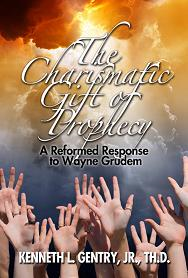
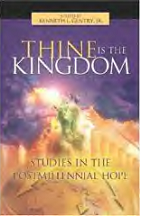
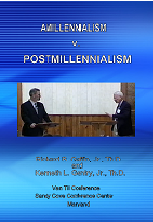
October 25, 2024
PROPER COMMUNION (2)
 PMW 2024-082 by Kenneth L. Gentry, Jr.
PMW 2024-082 by Kenneth L. Gentry, Jr.
In my previous posting, I introduced a new, five-part series on the proper administration of the Lord’s Supper. This article continues the study (which requires your reading the first article for a proper orientation). I am offering this study series due to my concern that the church in America has become too palsy-walsy and superficial. And I believe this is especially dangerous in regard to the sacrament of communion, which is a holy ordinance that distinguishes Christians from the world. So let us continue.
GENERAL ARGUMENT FOR FENCING
As we engage our inquiry into the biblical warrant for fencing the Table, we must begin with an irrefutable observation: the New Testament provides strong evidence that some form of fencing is required in inviting people to partake of the Lord’s Supper. Once this is recognized we have laid the essential, basic, foundational cornerstone for fencing as a general truth in Scripture. This then will open the more specific evidence for our particular form of fencing. We would argue on the basis of the following evidence that “open communion” without any fencing whatsoever is not only unbiblical but anti-biblical and dangerous.
First, the issue of faith in Christ
The most basic element in fencing the Table is the call for faith in Christ. Some liberal confessions allow access to the Lord’s Supper to any interested inquirer regardless of his or her current profession. Most evangelicals, however, disagree, noting that the Lord’s Supper is only for believers. After all, Paul expressly declares: “Is not the cup of blessing which we bless a sharing in the blood of Christ? Is not the bread which we break a sharing in the body of Christ?” (1 Cor 10:16). How can unbelievers “share” in the blood and body of Christ — while in unbelief and therefore not “in Christ”? Peter denounces Simon the Sorcerer for his false (Acts 8:13) profession of faith: “You have no part or portion in this matter, for your heart is not right before God” (Acts 8:21). The same declaration would surely be true of someone who has no profession of faith in Christ whatsoever.
What is more, consider the implications of Paul’s command that “you not to associate with any so-called brother if he should be an immoral person, or covetous, or an idolater, or a reviler, or a drunkard, or a swindler — not even to eat with such a one” ( 1 Cor 5:11). If the Apostle forbids mundane fellowship-eating with rebellious claimants to Christ (one who is a “so-called brother,” i.e., one who professes to be a brother), surely he would forbid eating the Lord’s Supper with them in the context of worship (we will see later that he does, when we highlight 1 Cor 11:27–29). And if he forbids eating with such professing Christians, surely he would forbid eating the Lord’s Supper by non-Christians who do not even profess Christ.
"> 1 John: Salvation, Heresy, Assurance
1 John: Salvation, Heresy, Assurance
20 downloadable mp3 sermons by Ken Gentry
First John is a much neglected epistle that deals with crucial issues: it explains salvation, warns against heresy, and demonstrates the assurance of salvation. Very helpful, especially for new Christians.
See more study materials at: www.KennethGentry.com
Thus, since the Lord’s Supper may be given only to those who profess faith in Christ, this in and of itself becomes a fencing issue. Such a recognition endorses the general principle of fencing. So then, for most Bible-believing Christians fencing of some kind is inescapable. And now in light of this, the question arises: How shall unbelievers know they should not partake if the minister does not inform them? How shall they refrain from partaking if some sort of fencing statement is not made?
In addition, a dangerous conclusion of the theology that would dismiss fencing in general quickly arises: On the non-fencing principle if a minister should not make a basic fencing statement before the Lord’s Supper, how shall church officers require a profession of faith from anyone before they are allowed to join the church from outside its boundaries? Open communion with its denial of fencing the Table implies open membership. That is, does not anti-fencing imply that even allowing church officers to examine potential church members is illegitimate, for this puts someone (a church officer) between Christ and the individual?
Second, the issue of water baptism
Virtually all evangelical Christians agree that baptism is the initiatory sacrament of the visible church in the new covenant. That is, baptism is the sacrament which introduces a person into the visible church as an historical entity. The Lord’s Supper is not an initiatory sacrament, but one that necessarily follows after baptism.
We see that baptism is the initiatory sacrament in the missionary context of the Apostolic church. When people are converted to Christ we read of their immediately being accepted for baptism, never of their first partaking of the Lord’s Supper. Baptism represents their entry into the kingdom of God as we see from the following biblical evidence:
• Christ gives his church the Great Commission in such a way as to demand the initiatory nature of baptism: “Jesus came up and spoke to them, saying, ‘All authority has been given to Me in heaven and on earth. Go therefore and make disciples of all the nations, baptizing them in the name of the Father and the Son and the Holy Spirit, teaching them to observe all that I commanded you; and lo, I am with you always, even to the end of the age.’” (Matt 28:18–20)
• Peter preaches the gospel to the Jews in Jerusalem, offering them entry into the visible church through baptism: “‘Repent, and let each of you be baptized in the name of Jesus Christ for the forgiveness of your sins; and you shall receive the gift of the Holy Spirit’ . . . . So then, those who had received his word were baptized; and there were added that day about three thousand souls. . . . And the Lord was adding to their number day by day those who were being saved.” (Acts 2:38, 41, 47)
• Of Phillip’s evangelistic encounter with the Samaritans we read of the converts’ reception through baptism: “But when they believed Philip preaching the good news about the kingdom of God and the name of Jesus Christ, they were being baptized, men and women alike.” (Acts 8:12)
• Peter reports of his evangelistic encounter with the Gentile Cornelius in similar terms: “While Peter was still speaking these words, the Holy Spirit fell upon all those who were listening to the message. And all the circumcised believers who had come with Peter were amazed, because the gift of the Holy Spirit had been poured out upon the Gentiles also. For they were hearing them speaking with tongues and exalting God. Then Peter answered, ‘Surely no one can refuse the water for these to be baptized who have received the Holy Spirit just as we did, can he?’” (Acts 10:44–47)
• Paul’s evangelistic encounter with Lydia follows the same pattern: “And a certain woman named Lydia, from the city of Thyatira, a seller of purple fabrics, a worshiper of God, was listening; and the Lord opened her heart to respond to the things spoken by Paul. And when she and her household had been baptized, she urged us, saying, ‘If you have judged me to be faithful to the Lord, come into my house and stay.’” (Acts 16:14–15)
• Paul’s evangelism among the people at Corinth continues the practice: “And Crispus, the leader of the synagogue, believed in the Lord with all his household, and many of the Corinthians when they heard were believing and being baptized.” (Acts 18:8)
• Paul’s testimony of his conversion shows he was converted and then immediately baptized: “‘And now why do you delay? Arise, and be baptized, and wash away your sins, calling on His name.’” (Acts 22:16)
• Paul’s theology sacramentally associates baptism with entering into Christ: “For all of you who were baptized into Christ have clothed yourselves with Christ.” (Gal 3:27)
Unto You and Your Children By Larry E. Ball
By Larry E. Ball
This book defines and illustrates the covenant as it appears in the Bible, and then demonstrates how the covenant affects our children as we raise them in the church. It also develops a justification for infant (covenant) baptism.
However, before the writer examines the idea of the covenant in the Bible, he first covers a number of other topics that a person needs to understand before he can understand the covenant. He spends at least one chapter revisiting the gospel. What is the gospel? He then establishes the meaning of such words as regeneration, conversion, election, and salvation. He is convinced that before a person can properly understand the covenant and covenant baptism there must be some agreement on the definition of these other terms.
See more study materials at: www.KennethGentry.com
Thus, we see from the New Testament record itself that baptism is frequently administered in the very context of evangelistic encounters that result in conversion. We do not have a direct statement in Scripture that declares: “You must first be baptized and only then may you partake of the Lord’s Supper.” But neither do we have a direct statement in Scripture commanding that we baptize our children. Nor do we have a direct statement that informs us we are no longer to worship on Saturday (even though Saturday worship is the Fourth Commandment). Neither do we have a direct statement declaring “God is a Trinity.” Yet we hold these and many other such doctrines to be biblically-based truths. So then, from the recurring evidence just listed we may logically surmise that all who partake of the Lord’s Supper must be baptized first, just as we require in this fencing statement.
As the Westminster Confession says and as all evangelicals believe: “The whole counsel of God concerning all things necessary for His own glory, man’s salvation, faith and life, is either expressly set down in Scripture, or by good and necessary consequence may be deduced from Scripture” (WCF 1:6). So then “by good and necessary consequence” we see another basic element for fencing the Table in addition to a profession of faith in Christ: all partakers must be baptized before they may share in the Lord’s Table. This is historically why all evangelical churches have required baptism as a pre-requisite for taking Communion.
Third, the issue of apostolic example
We must note that Paul specifically endorses fencing the Table in 1 Corinthians. In 1 Corinthians 10:21 he dogmatically declares to the Corinthians: “You cannot drink the cup of the Lord and the cup of demons; you cannot partake of the table of the Lord and the table of demons.” We must also realize that the Corinthians profess faith in Christ, for Paul calls their church “the church of God which is at Corinth” (1 Cor 1:2a). Indeed, it is made up of “brethren” (1 Cor 1:10, 26; 2:1; 3:1; 4:6; 7:24; 10:1; 12:1; 14:6; 16:15) whom Paul calls “my brethren (1 Cor 1:11; 11:33; 14:39). Yet he warns them that they may not partake of the Lord’s Supper if they continue partaking of sacrificial meals offered to idols. They must “flee idolatry” (1 Cor 10:14) because idol sacrifices involve them in demon worship (1 Cor 10:20). To partake of idol sacrifices provokes the Lord to jealousy (1 Cor 10:22).
In fact, as noted above Paul forbids them to even “associate with any so-called brother if he should be an immoral person, or covetous, or an idolater . . . not even to eat with such a one” (1 Cor 5:11). Surely this prohibits the idol-worshiping, professing Christian (“so-called brother”) from sharing the Lord’s Supper in the context of worship.
What is more, Paul expressly warns: “therefore whoever eats the bread or drinks the cup of the Lord in an unworthy manner, shall be guilty of the body and the blood of the Lord. But let a man examine himself, and so let him eat of the bread and drink of the cup” (1 Cor 11:27–28). At the very minimum this is a fencing statement that warns the rebellious Christian to forgo the Lord’s Supper. We will have more to say about this later, but for now we can see once again that the Bible generally endorses fencing the Table.
“Infant Baptism” by Ken Gentry
A brief biblical introduction to infant baptism employing both Old Testament and New Testament exposition.
See more study materials at: http://www.KennethGentry.com
http://www.kennethgentry.com/products/Infant-Baptism.html
Conclusion
So then, the New Testament does in fact establish the practice of fencing the Lord’s Table. It clearly demands that the administration of the supper must be given only to those who are professing Christians, who are baptized in Christ’s name, and who have examined themselves to see if they are spiritually ready to partake. Thus, the first two elements in our fencing statement (and our informal ministerial declaration) have been confirmed from Scripture.
Having established the biblical warrant for a basic fencing of the table, and having established the first two points in the formal statement, we are now ready to focus on issues impacting the last two fencing statements. Next time, that is!
Click on the following images for more information on these studies:

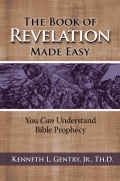
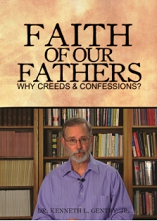
October 22, 2024
PROPER COMMUNION (1)
PMW 2024-081 by Kenneth L. Gentry, Jr.
INTRODUCTION

For the postmillennial hope to progress in this fallen world, the church needs to get her act together. We need a new Reformation. Contemporary worship has declined to such a deplorable level that her offering cheap entertainment rather than devout worship has diminished her influence in God’s world. One area (among many) wherein the church needs to return to her biblical standards is in the partaking of communion, i.e., the Lord’s Supper.
I will be offering a five-part study of the matter of “Proper Communion” as my contribution to this area of much need reformation. I hope you will follow me through this important study.
When I was pastoring and we celebrated the Lord’s Supper I made the following formal statement, which along with the minister’s personal call for participants to examine themselves, represented our method of fencing the Lord’s Table in the exercise of communion:
“We invite to the Lord’s Supper all who are believers in Christ, who are baptized members in good standing of an evangelical church, and who have been formally approved by church officers of an evangelical church to take communion.”
This formal fencing statement basically consists of a four-fold requirement. It requires that anyone who partaking of the Lord’s Supper must be:
1. a believer in Christ
2. baptized in his name
3. a member in good standing of an evangelical church
4. formally admitted to the Lord’s Table by ordained church officers of an evangelical church.
 Christ’s Church (20 mp3 downloads)
Christ’s Church (20 mp3 downloads)
by Ken Gentry
An in-depth sermonic presentation of the doctrine of the church. This is vitally important today with the evangelical church not living up to its biblical calling
See more study materials at: www.KennethGentry.com
OUR FENCING INQUIRY
I formulated this statement based on the Scriptures as our ultimate authority and the Westminster Standards as our secondary authority. Though other issues will necessarily be drawn into our study, the two foundational questions that this paper will consider are:
1. Why should we fence the Lord’s Table?
2. How shall we fence the Lord’s Table?
As we engage the questions before us we should recognize that the sacraments must be set in the larger context of ecclesiology (the doctrine of the church). Our fencing inquiry is not a simple question that can consider the sacrament in the abstract. Rather it is a complex matter involving several issues of wider biblical, theological, and practical significance. Our study will therefore involve the following issues:
• The visible-invisible church distinction.
• The necessity, legitimacy, function, and power of church officers.
• The legitimacy of church discipline.
• The importance of and obligation to formal church membership.
• The nature of the sacrament.
• The relationship of the new covenant sacrament to those of the old covenant.
• The spiritual danger of abusing the sacrament.
• The inescapable necessity of fencing.
Our historical setting
Self-consciously Reformed churches recognize that our theological heritage holds a high view of ecclesiastical government. Indeed, the word “presbyterian” derives from the Greek word presbuteros, which is generally translation “elder” in the New Testament (e.g., Acts 14:23; 15:4; 1 Tim 5:17, 19). Thus, Presbyterians have adopted a name that emphasizes representative church government through elder rule.
Furthermore, our historic Presbyterian and Reformed theology is confessional, providing a careful, formal, public declaration of faith that, according to its first chapter (WCF 1), is self-consciously rooted in Scripture. Thus, historically Presbyterians have adopted the Westminster Standards as their foundational theological formulation.
In light of our present fencing inquiry we recognize that our Westminster Confession of Faith observes that persons must be “admitted to” the Lord’s Table, i.e., they do not have an individual right to partake of it without any external oversight:
“ignorant and ungodly persons, as they are unfit to enjoy communion with [Christ], so are they unworthy of the Lord’s table; and cannot, without great sin against Christ, while they remain such, partake of these holy mysteries, or be admitted thereunto.” (WCF 29:8)
 Christian Theistic Ethics (29 mp3 downloads)
Christian Theistic Ethics (29 mp3 downloads)
by Ken Gentry
Formal Christ College course on Christian Theistic Ethics. Explains and defends theonomic ethics from the Scriptures of both the Old and New Testaments. Helpful for introducing theonomy to Christians living in our secular times and desiring to understand biblical ethics.
See more study materials at: www.KennethGentry.com
This act of admitting is accomplished by duly authorized officers of “particular churches” (WCF 25:4) to whom have been given “the ministry, oracles, and ordinances of God” (WCF 25:3).Thus, our Confession further states that:
To these officers the keys of the kingdom of heaven are committed; by virtue whereof, they have power, respectively, to retain, and remit sins; to shut that kingdom against the impenitent, both by the Word, and censures; and to open it unto penitent sinners, by the ministry of the Gospel; and by absolution from censures, as occasion shall require.
Elsewhere we learn that Presbyterian churches should only give the bread and wine “to the communicants” (WCF 29:3).
My Current Concern
Next I will provide a brief biblical defense of our Presbyterian and Reformed method of fencing the Lord’s Table, which we believe to be warranted by Scripture. I will build the case for this four-fold fencing statement by laying down one brick at a time. Beginning in my next article.
Reformed Eschatology in the Writings of Geerhardus Vos
Ed. by Ken Gentry and Bill Boney
This is a collection of several key eschatological studies by the renowned Reformed theologian Geehardus Vos. We have modernized Vos’ grammar and syntax and updated his layout style according to modern publishing conventions (shorter sentences and paragraphs). We did this without changing any of Vos’ arguments.
For information on the Geerhardus Vos work or to order it, see:
https://axeheadpress.com/pages/coming-soon-vos
October 11, 2024
WHY JOHN WROTE TO ASIA MINOR
 PMW 2024-080 by Kenneth L. Gentry, Jr.
PMW 2024-080 by Kenneth L. Gentry, Jr.
In my orthodox preterist understanding of Revelation, I see the bulk of John’s drama (as it transpire on the historical plane) as largely focusing on the destruction of Jerusalem in AD 70. Many opponents of this strong Judaic focus complain that we cannot explain John sends Revelation to Asia Minor (Rev. 1:4, 11; 2:1–3:22). It would seem that the message should be sent to Jerusalem. Why did John send his message on the destruction of the temple and Jerusalem to Christians in Asia Minor? The seven churches were not only several hundred miles away from Jerusalem, but were in non-Jewish territory well outside of Jewish Palestine.
There are several reasons for John’s directing his seven letters (actually “oracles”) to Asia Minor. I will briefly summarize a few.
First, John ministered to the seven church in Asia Minor. We can see from his seven oracles within that he knew the churches well. So, as their minister, he directs his dramatic message to them.
Second, the “capital” of Christianity was in Jerusalem, where Christianity began and first ministered (e.g., Luke 24:46-53; Acts 1, 4; 2:14; 5:16; 6:7). We can see Jerusalem’s strong influence over the nascent Christian faith in Acts 15, where we find the Jerusalem council setting policy for the church (Acts 15:1–2).
The Divorce of Israel: A Redemptive-Historical Interpretation of Revelation
This long-awaited commentary has now been published. It is an 1800 page, two-volume deeply exegetical, academic commentary on the Bible’s most mysterious book.
Click: https://www.kennethgentry.com/the-divorce-of-israel-2-vols-by-gentry-pre-publication-offer/
See more study materials at: www.KennethGentry.com
Third, since Jerusalem was originally the “capital” of Christianity, Christians everywhere would need to know why Jerusalem was destroyed and what that meant for the Christian faith. Was the Christian faith to be a temporary movement that would soon fade away with the demise of its central city and church? John explains this in the Revelation.
Fourth, when John wrote, a great percentage of Christians were of Jewish heritage. They would be under intense pressure from their families in their homes+ and their religious associates in their occupations. They would need to know why the temple and Jerusalem were destroyed, bringing an end to historic Judaism. Judaism underwent radical change when its central temple was destroyed: it transitioned from biblical Judaism to rabbinic Judaism.
Fifth, the churches in Asia Minor would be under the persecution that John highlights in Revelation. This persecution would arise from both Rome and Jerusalem. They would need to see that God’s hand is behind all of this. They need to hear the Spirit’s call to endurance despite their grievous circumstances: they must endure and overcome (Rev. 2:7, 11, 17, 26; 3:5, 12, 21). The Epistle to the Hebrews shows that many Jewish Christians were apostatizing from the faith under persecutional pressure (Heb. 10:32–11:39).
Four Views on the Book of Revelation
(ed. by Marvin Pate)
Helpful presentation of four approaches to Revelation. Ken Gentry writes the chapter on the preterist approach to Revelation, which provides a 50 page survey of Revelation .
See more study materials at: www.KennethGentry.com
Sixth, though John addresses his “letters” to seven churches, they are not meant only for those individual churches. For the letters were intended for “all the churches” (Rev. 2:23; cp. 2:7, 11, 17; 2:29; 3:6, 13, 22; 22:16). This is much like Paul addressing his letters to particular churches or persons, yet their having relevance beyond those particular groups or persons.
Thus. the fact that John wrote to seven churches in Asia Minor does not undermine the preterist’s interpretation of Revelation.
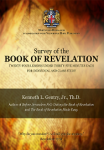
Survey of the Book of Revelation
(DVDs by Ken Gentry)
Twenty-four careful, down-to-earth lectures provide a basic introduction to and survey of the entire Book of Revelation. Professionally produced lectures of 30-35 minutes length.
See more study materials at: www.KennethGentry.com
Kenneth L. Gentry Jr.'s Blog
- Kenneth L. Gentry Jr.'s profile
- 85 followers



